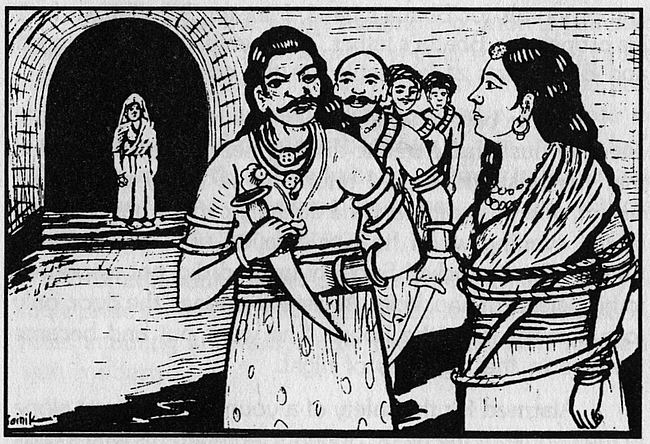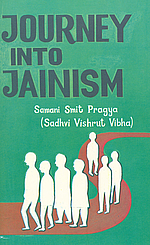A girl named Bhatta was born to a wealthy family in the city of Avanti. She was beautiful and highly intelligent, but also very stubborn and she unfailingly demanded homage from those around her. When she reached the appropriate age for marriage, Bhatta declared that she would marry a man who would never disobey her, or she would not marry at all.
The condition of Bhatta's marriage spread like fire throughout the city. After the passage of many years without any proposals for Bhatta's hand, Minister Subudhi put forth his proposal to Bhatta's father. The merchant was overjoyed, and Bhatta was at last settled in the domestic life.
Bhatta began her life at her new home. No one, not even her husband, dared to disobey her. Bhatta demanded that her husband should return home every day before sunset, and this command he dutifully carried out until one fateful evening when he was delayed until dark. Being furious, Bhatta locked Subudhi up and did not responsed to his persistent knocking. At last she opened the door, only to run away from the house. She went out and became invisible in the darkness of night.
Alarmed for the safety of a young woman out alone in the middle of the night, Subudhi regretted his wife's brisk stride. As fate would have it, his fears were indeed confirmed. Bhatta was soon abducted by thieves. They wasted little time in stripping her of her valuables and replacing them with a simple peasant garment, then presented her to their leader as a tribute.
Trembling with the rage of insulted pride, Bhatta succeeded in convincing the thieves' leader to keep his distance at least. Tortured daily, she bore the pain in silence but didn't give up chastity.
One day the chief thief's mother remarked on Bhatta's admirable tolerance. She told her son, "She is not an ordinary woman. It will do you no good to torture her. A curse from her lips might bring disaster upon our heads. I advise you, my son, to torture her no more."

As fate would have it, his fears were indeed confirmed. Bhatta was soon abducted by thieves.
Heeding his mother's advice, the thief did not torture Bhatta again, but instead sold her to a trader for a considerable sum. The trader, enraged by her refusal to succumb to his immoral advances, started torturing her. Everyday he would take from her body a little bit more of her blood, and with it, her strength, her anger, and her pride.
After some time, Bhatta's brother, in search of his feared but beloved sister, arrived in the city where she was being held captive by the trader. Seeing a girl with the similar features of his sister on the street, he followed her to the trader's house and, explaining that she reminded him of someone, asked the trader about her background and her relation to the trader. Unable to receive a satisfactory reply, the brother specified his questions and recognized the answers as lies. Then being sure that the woman he saw was his sister and that she was not being treated well by that dangerous man, Bhatta's brother offered the trader enough money to get him to confess the truth and sell Bhatta to her brother. Once home, her brother bought Bhatta new clothes and helped her to recuperate. When Subudhi learned of Bhatta's rescue and recovery, he was overjoyed. He brought her back home with all honour.
But this was not the same woman that had stormed into the night not so long ago. Washed of all excesses of emotions such as pride and anger, Bhatta was patient and polite, even gentle, and above all grateful for saving her live from an awful situation among cruel and violent criminals. Her transformation hardly passed unnoticed; news of her respectfulness and inexhaustible virtue reached beyond the household and even beyond the town.
The highest of the immortals spoke well of Bhatta's power of forgiveness and her inner peace. He even proclaimed that no being could compete with Bhatta in this respect. One ifnmortal, jealous of the divine praise accorded to mortal Bhatta, decided to test the woman's virtue. He hid himself in Bhatta's pantry at the moment when two monks came to Bhatta's door to ask for oil for one of the monk's badly burnt hands. Bhatta asked her maid to bring a jar of oil. The invisible immortal pushed the jar from the maid's hands. Calmly, Bhatta requested her maid to fetch another jar. Again the immortal knocked the other container down, and again for the third time the maid was sent for it. Suspecting some superhuman inter, the monks told Bhatta not to worry about it, nor be angry with the maid and they were about to leave.
"I bear malice towards none," Bhatta said quietly. "If you kindly allow me, 1 shall go myself and bring it for you." As she picked up the vessel, the immortal tried his best to push it from her hands, but all his efforts were fruitless because of the purity of Bhatta's heart. After the monks had gone, the immortal appeared before her and begged forgiveness. He restored the oil in the three containers, so that nothing was actually lost.
The immortal said, "I am overwhelmed by the purity and tranquillity of your soul. I will grant you whatever boon you wish."
"Thank you very much for your kind words," replied Bhatta, "but I am satisfied with all I have. 1 need no more."
Greatly impressed with her purity, and ashamed of his pride, the god left Bhatta praising and blessing her.
 Sadhvi Vishrut Vibha
Sadhvi Vishrut Vibha
